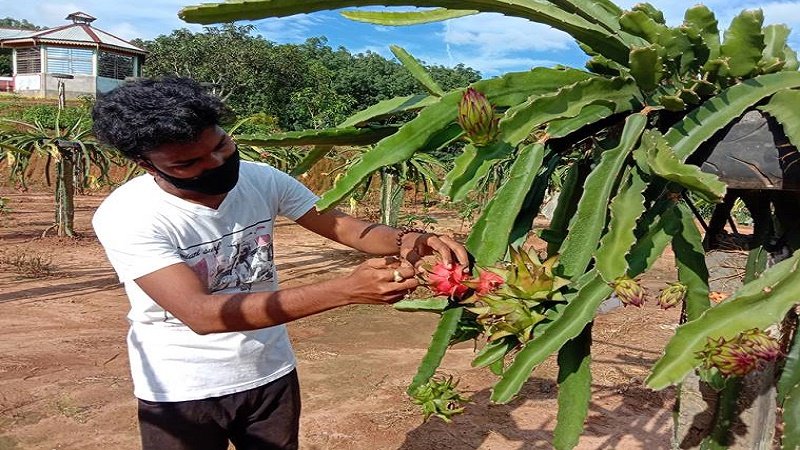In 2017, Das came across dragonfruit in YouTube. He then converted a part of his 1.5 acre mango and mosambi orchard into dragonfruit plantation and the experiment commenced.
Debraj Deb: Meet Parimal Das, a Tripura horticulturist, who has successfully grown the state’s first commercially viable dragonfruit plantation, all with his lone efforts and a little bit of help from YouTube.
The 55 year-old horticulturist was into mango, mosambi, lemon and rubber plantation at his ancestral Kanchanmala village in West Tripura, 25 Km from here, since last four decades. But with developing transport communication, abundance of imported fruits, heavily competitive rates and repetitive insect attacks, he looked for an alternative – something he would do for the first time in his state.
In 2017, Das came across dragonfruit in YouTube. He asked his son to help him with getting more information online.
Speaking to me at his farm, Das said, “I collected all information I could get regarding dragonfruit from YouTube. It has medicinal values, it has a very good market and is very easy to grow. I thought of giving it a try”.
Dragonfruits are tropical fruits native to Mexico and Central America. But lately, many have been cultivating the fruit in different parts of India like Maharashtra, Karnataka, West Bengal etc. The plants look similar to cactus when young and need a strong support nearby to creep on.
With no one to guide him, Parimal contacted a supplier from Kolkata and got his first batch of dragonfruit plants at a hefty price of Rs. 250 per piece.
He converted a part of his 1.5 acre mango and mosambi orchard into dragonfruit plantation, built eight concrete pillars, planted four plants on each pillar, set up a 120 Kg vermi-compost unit and the experiment commenced. The entire venture cost him around Rs. 15,000. Within next 18 months, the first dragonfruits emerged.
“I got tremendous success in my first year and soon converted my entire orchard to dragonfruit plantation. Now I have got 500 pillars and 2,000 plants standing, all of them bearing fruits and ready to harvest”, Parimal said.
Once the plants start flowering, they keep bearing fruits for most of the year. A single plant bears upto 20 Kg fruit a year, selling at Rs. 400 per Kilo to wholesale traders. With 2,000 plants harvest-ready and thousands more growing in nursery, Das feels he is good to go for years to come.
“All I need now is a good marketing support and the state government has assured me help on this front,” he said.
Das’ 21-year-old son Joydeb Das is an under-graduate commerce student at Ramthakur College, a government degree college at Agartala. He lends a helping hand to his father in the orchard from time to time.
Speaking on his experience so far, Joydeb said he and his relatives were initially perplexed to see his father buying cactus-like plants, building pillars for them, watering them while doing away with all the mango, mosambi, and lime plants which had been their source of livelihood for years.
“Once the plants bore fruit, we saw what father was aiming for. Dragonfruits are very tasty and they are fetching a good price. I have suggested many of my friends to take up growing dragonfruits. I guess some of them are taking it seriously”, he said.
Das’ dragonfruit experiment has found good response from the government so far. Chief Minister Biplab Kumar Deb appreciated his efforts and recently wrote on Facebook that Das’ story is inspiring.
“…..He is an inspiration to many other farmers and young agri-allied entrepreneurs who may also take such initiatives as both the State & the Central Governments have taken several initiatives under the leadership of PM Shri Narendra Modi to double the farmers’ income by 2022”, Deb wrote on his Facebook page.
Ajoy Kumar Das, chairperson of the local Dukli Panchayat Samiti, recently built a dragonfruit plantation of his own on the panchayat samiti land for villagers and public representatives to see and be inspired.
Speaking to indianexpress.com, he said Parimal’s dragonfruit orchard was built by his lonesome but it can now serve the purpose of proving to others that dragonfruit can be as popular and successful as Tripura’s famous queen pineapples, which has made its way to Dubai, Qatar, Bangladesh alongwith many Indian states like Mumbai, Bangalore, Delhi, Kolkata etc.
However, some agri-experts feel that scientific testing for diseases, insect infestation, taste, agro-climatic adaptability still needs to be tested before the fruit can be given a go for largescale cultivation.indianexpress

